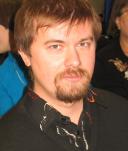Philology: scientific researches
Reference:
Boyko M.
The Operator Approach to the Theory of Literature: Narrative Operators, Their Features and Scope of Application
// Philology: scientific researches.
2016. є 3.
P. 268-276.
DOI: 10.7256/2454-0749.2016.3.18352 URL: https://en.nbpublish.com/library_read_article.php?id=18352
Boiko Mikhail
PhD in Art History
not provided
121069, Russia, g. Moscow, per. Trubnikovskii, 17, redaktsionno-izdatel'skii otdel

|
michboy@mail.ru
|
|
 |
Other publications by this author
|
|
|
You can simply select and copy link from below text field.


